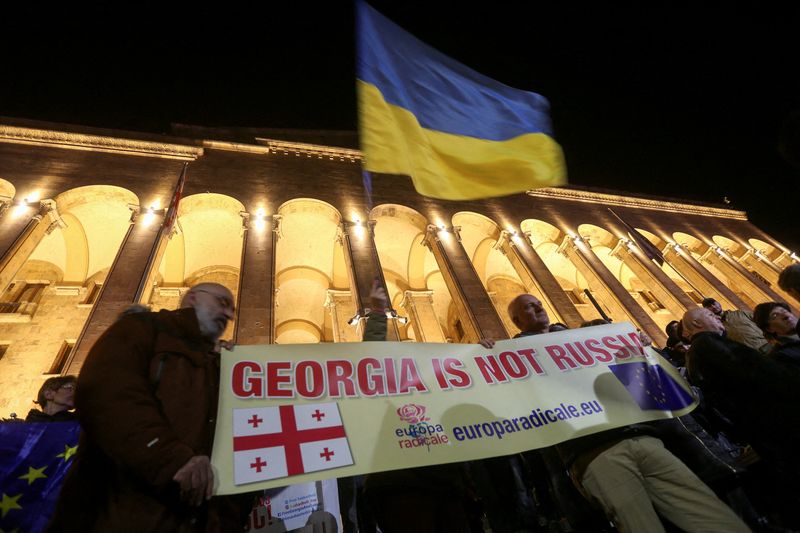(Reuters) - Elections in Georgia and Moldova have shown the European Union just how tough a task it faces in trying to expand to countries that Moscow considers in its sphere of influence.
The EU has been making a renewed push to bring in new members since Russia's invasion of Ukraine in 2022, saying the outbreak of war has shown the danger of having "grey zones" just outside the bloc that are not firmly part of the West.
In Georgia, a governing party seen by most EU countries as increasingly Moscow-friendly won a parliamentary election on Saturday that was marred by reports of voting violations.
In Moldova, which like Georgia has been granted EU candidate status, only a slim majority of voters backed anchoring the goal of EU accession in the constitution in a referendum this month and pro-Western President Maia Sandu faces a runoff vote after falling short of outright victory in a presidential election.
Pro-EU politicians in the two former Soviet states said Russia had engaged in widespread disinformation and other forms of interference to sway the vote. Moscow denies the accusations.
"It was a wake-up call for us. Of course, we have to see it," Reinhold Lopatka, an Austrian member of the European Parliament who was an observer in Georgia’s election, said of the votes in both countries.
Lopatka said he still saw "good chances" of Moldova progressing on its path to the EU, but added: "In Georgia, I'm not sure."
Enlargement, mainly into eastern Europe, was a big EU geopolitical goal after the Cold War ended. Would-be members saw joining the wealthy, democratic bloc as a glittering prize.
The EU added 10 new members in 2004 and later three more, but enthusiasm waned as EU governments voiced concerns about east-to-west migration and democratic backsliding in some newer members. Then Russia's war in Ukraine prompted a rethink.
European Commission President Ursula von der Leyen said on Monday the EU would pay a price in terms of "war and instability at our borders" if it did not enlarge. Pro-EU leaders in candidate countries say joining the bloc would bring more prosperity and strengthen democracy in their countries.
David McAllister, chair of the European Parliament’s foreign affairs committee, said the Moldovan and Georgian elections underlined "the tense and polarised political situation" in both countries but that the EU must stick to its course.
"The European Union should be ready to continue in its support of the democratic forces in both countries, in order to facilitate their long-term European integration," he said.
LACK OF UNITY
The EU’s approach to Georgia and Moldova is complicated by a lack of unity among its member countries.
Lithuania said the widespread reports of election irregularities called the results of the Georgian election into "serious question". Another Baltic state, Latvia, voiced serious concern about the reports of voting irregularities and urged Georgian authorities to investigate.
By contrast, Hungarian Prime Minister Viktor Orban congratulated the governing Georgian Dream party before official results were announced. Orban, who is Europe’s most Kremlin-friendly prime minister and holds the EU’s rotating presidency, arrived in Georgia on Monday.
"Instead of useless lecturing, they need our support on their European path," he said.
Senior EU officials sought some middle ground. Foreign policy chief Josep Borrell and the executive European Commission said observers had found an "uneven" electoral playing field in Georgia and called on authorities to investigate irregularities.
They avoided saying whether they considered the election free and fair enough to accept the result.
The EU will face decisions on how to proceed with both Georgia and Moldova. Until now, the Baltic countries of Lithuania, Estonia and Latvia are the only former Soviet republics that have joined the EU, and Moscow has signalled fierce resistance to the accession of any more ex-Soviet states.
Georgia's EU accession process is frozen over legislation that requires organisations receiving more than 20% of their funding from abroad to register as agents of foreign influence.
If Georgian Dream's victory is not overturned, the EU will have to decide whether to try to re-engage with Tbilisi. The party says it wants Georgia to join the EU despite taking steps away from the EU mainstream.
In Moldova, much will depend on whether the Nov. 3 runoff vote is won by Sandu or challenger Alexandr Stoianoglo, who is backed by a traditionally pro-Russian party.

Some current and former Moldovan officials say the EU should double down on its support for the country's EU aspirations.
"European integration should be continuously used as an instrument to help countries which are problematic become safer, more democratic and stable and secure," said Nicu Popescu, a former Moldovan foreign minister now with the European Council on Foreign Relations think tank.